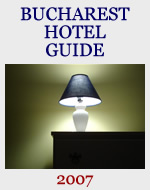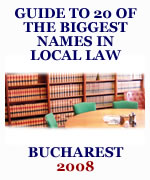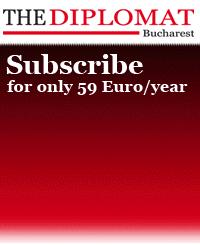How to make friends and influence the EU
Romania lacks a coherent post-EU accession strategy, so ‘The Diplomat - Bucharest’ asked politicians and experts how they believe the country will play in its role as seventh largest member state. Ana-Maria Nitoi reports
|
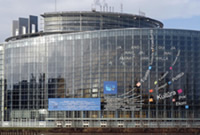 Six months after joining the European Union, the nation with the largest needs in the 27-member bloc has become a net contributor to the EU budget.
Six months after joining the European Union, the nation with the largest needs in the 27-member bloc has become a net contributor to the EU budget.
Romania’s Government has not started to absorb and allocate the billions of Euro available from EU funds to restructure its country.
The nation is also waiting for a report from the European Commission, assessing the country’s reform of the justice system. If this report is negative, Romania’s legal system and decisions will not be recognised by Brussels. This will be an act of humiliation for the south-eastern country.
These are symptoms of what many feel is a failure by Romania to make the most of its EU member status.
The country still lacks a post-accession strategy from Prime Minister Tariceanu’s Government, due in the first months of 2007.
This includes policies it will champion and those it will denigrate, the sectors where it can speak with authority and the new ideas the country can contribute towards the European project. Romania also needs to find other nations with whom it can form alliances.
Donato Chiarini, head of the European Commission’s Representation in Romania, says Romania needs a “clear view of what it wants to do”. All domestic and foreign MEPs we spoke to for this article argue that knowing its interests and having clear objectives to choose the perfect strategies to achieve these goals are essential for Romania at this time.
Cornel Codita, a military and political analyst and the Dean of the International Relations Department at the National School for Administrative and Political Studies (SNSPA) in Bucharest, says the country has a “very weak position” in Europe because of the negative inheritance from the pre-accession period. Romania has a bad image in Europe, particularly in Germany and Great Britain.
“In Brussels, Romania doesn’t have the weight and importance of the seventh EU largest country, because of its political system and its inability to maintain a good relationship with the EU,” the analyst says.
The European Commission seems dissatisfied at the absence of clarity regarding Romania’s policy on integration matters and observers all agree that Romania lacks a defined national interest in the EU.
The ongoing political battle between the Prime Minister and President seems to have pushed the priority of formulating an understanding of Romania’s role in the EU to the bottom of the ‘to-do’ list.
This strategy should not be a simple document issued by the Cabinet, but should offer Romania’s representatives in Brussels a bi-partisan mandate to support in its EU negotiations. “How does one generate cohesive thinking at national a level in order to reach a national interest to be promoted in Brussels?” asks Chiarini. “Is Romania a mild or a full integrationist? A Post-Accession Strategy could bring answers to such questions.”
Here The Diplomat - Bucharest analyses the areas where Romania could speak with authority and where it must be heard in the EU.
AGRICULTURE
Romania needs to have a pro-active voice in Europe on agricultural reform because this is where huge investment and modernisation is necessary. The country must not become the biggest loser in the EU’s current trend to cut farm subsidies.
Around 40 per cent of the EU’s Structural Funds are destined for agriculture and rural development and, in 2008, Romania should benefit from the same amount of cash from the Common Agricultural Policy (CAP) as other EU nations.
Romania’s soil quality and continental climate are advantages – with plenty of arable land in the south, pastoral land in Transylvania and the potential for organic farming. But droughts and floods in the last two years have highlighted the failures of irrigation and drainage in its rural infrastructure, where almost one third of Romanians work.
“Agriculture is a weak point that can be transformed into an advantage,” says diplomat Iordan Gheorghe Barbulescu, an expert on EU matters. “The soil hasn’t yet been affected by fertilisers and we can move towards environmentally-friendly agriculture at the highest standards.”
But the head of the Department of European Affairs, Adrian Ciocanea, says it is difficult for Romanian authorities to keep pace with the continuous transformations of CAP.
He says Romanian agriculture is built on EU’s framework for agriculture that was relevant a few years ago. “Romania needs to skip a few phases and to understand the tendencies in the EU to become compatible to the current situation,” he says.
The EU is moving away from agricultural reform to rural development and slashing its hand-outs to farmers at the moment when Romania may need these most.
Romanian MEP Corina Cretu says there are changes in CAP which do not coincide with Romania’s immediate objectives. “We should make a lot more effort to promote our specific interests,” she says.
ENERGY
Energy transport and the increased usage of nuclear energy could be areas where Romania can create informed policy-making in the EU. President Basescu has also argued in favour of a single energy policy for Europe.
Romania could become a part of the oil and gas transport routes from Central Asia and the former USSR to Europe. Last month Romania signed a memorandum for the construction of the pipeline transporting crude oil from the Caspian Sea to Trieste, Italy. Another project is the proposed Nabucco gas pipeline which carries gas from Central Asia to the EU, by the Caspian Sea and Black Sea, through Turkey to Romania and Austria.
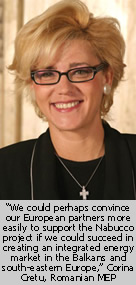 “Promoting the Nabucco project should be vital for Romania, because there are already alternative gas transport projects,” says Cretu. “We could perhaps convince our European partners more easily to support this project if we could succeed in creating an integrated energy market in the Balkans and south-eastern Europe.”
“Promoting the Nabucco project should be vital for Romania, because there are already alternative gas transport projects,” says Cretu. “We could perhaps convince our European partners more easily to support this project if we could succeed in creating an integrated energy market in the Balkans and south-eastern Europe.”
The current western rethinking on nuclear energy as an alternative to fossil fuels may also be a policy that Romania can promote, argues Cretu. Romania now covers ten per cent of its electricity demand through one reactor active at its nuclear power plant in Cernavoda, Constanta county. In one month its second reactor will function and the power plant will produce 18 per cent of domestic demand.
However, the current 27-member bloc suffers from tricky relations with Russia regarding the price and supply of energy. Although Romania is in a strategic position for Russia’s energy supply to Europe, President Basescu has evoked the ghost of Russophobia in recent statements, such as allegedly comparing Gazprom to the Red Army and calling for a move away from dependence on Russian oil and gas. This will make a stronger energy alliance between the two former Communist countries harder.
“In the transport of energy resources, Romania won’t be allowed to be part of any project in the near future because of the Government’s current position towards Moscow,” says economic analyst Ilie Serbanescu.
But Russia needs the EU as a trading partner and Romania may find that it is a more welcome ally when sitting at a negotiating table under an EU flag than one coloured yellow, red and blue.
“You negotiate in a certain manner with a single state, but in a different manner in the name of half a billion citizens,” says Barbulescu. “Russia needs to export gas because this is its main resource and it is not going to eat oil at breakfast and gas at noon.”
TRANSPORT
Romania, along with Bulgaria and Greece are important nodal points for Asian and Middle Eastern transport to the EU and all three should be key in forming transport policy. Romania has the benefit of the port of Constanta, one of the main links to Asia and the former USSR, and the Danube, which can link up to the Rhine and the North Sea.
The European Parliament has just approved the funding projects to make this inland waterway functional and a more enlightened use of the Danube could be necessary in improving relations with Bulgaria and Serbia.
In addition, the European Commission aims to extend the European Transport Network, to include EU’s neighbours in its internal transportation market.
Romanian Socialist MEP Adriana Ticau argues Romania will benefit from three route extensions: sea transportation, the EU to the Balkans, Turkey, the Caspian Sea and the Caucases, as well as a central route, tieing the EU to the Black Sea and Ukraine.
TRANSNISTRIA
As a member of the EU, Romania should now have a wider say in the future of the frozen conflict in Transnistria.
After the USSR collapsed, the Republic of Moldova declared independence. But, following a civil war in 1991, the territory over the Niester river declared its separation from the Republic. Unrecognised as a country by the international community, the region is now patrolled by 1,400 Russian troops. The only solution to this conflict will be one Russia favours.
However, Russia has not shown a willingness to engage with Romania directly on the issue. Now the country is part of the EU however, Romania can contribute towards a platform that can engage with its large eastern neighbour.
Romania’s relationship with the Republic of Moldova will also be important. This hit an all time low earlier this year when President Voronin of Moldova rejected Romania’s plan to open two new consulates on his territory, to process visa applications, amid fears that 100,000s of Moldovans would apply for Romanian citizenship. Meanwhile, Foreign Minister Cioroianu and President Basescu have both said they will support Moldova’s ambitions towards EU integration.
BLACK SEA SECURITY
Romania’s foreign affairs policy emphasises greater security in the Black Sea region against the export of terrorism, drugs and human traffic to the EU. However, when Romania organised a high-level international conference for heads of the state from the region in 2006, Turkey only sent a minister counsellor while Russia dispatched its Ambassador to Bucharest as an observer.
“The co-operation in this area cannot become a system of communication between equals, because Russia, Ukraine and Turkey want to mark out their regional power status,” argues Codita. “That is why the three states won’t ever accept Romania’s co-operation formula which states that we are all equals.”
As with Transnistria, only as a contributor towards the greater EU policy is Romania likely to become a force for change in the Black Sea.
WORKFORCE MIGRATION
Around two million Romanians are now living abroad, mostly in the EU, and sending money back home, in what is the biggest migration the country has ever experienced. Alongside Poland, this may be the largest number of displaced people inside the EU. One indication of the power of the Romanian lobby abroad is that in Italy, Romanian children in school will now be able to speak in their mother tongue and, in Spain and Italy, Romanians are assuming positions in local administration.
Policy regarding internal migration will be an area where Romania must speak with authority for the benefit of its citizens abroad. But this is also a massive concern at home, due to Romania’s fear that its workforce could haemorrhage.
“We have a country in a depopulation process,” argues economic analyst Ilie Serbanescu. “This is Romania’s biggest problem.”
LOOKING FOR ALLIANCES
“I don’t believe we should look at making alliances, but to create partnerships with states that have a vision similar or close to that of Romania’s in areas like agriculture, environment, energy, immigration policy, but without neglecting the states with different views,” Minister of Foreign Affairs, Adrian Cioroianu, tells The Diplomat.
But the EU is a club of deal-making and most foreign MEPs we spoke to said that temporary alliances on a certain policy, issue or decision are the most beneficial.
“It is not healthy to be always in the opposite camp of certain states like the rich and very liberal northern states,” says Hungarian MEP Zsolt Becsey. “It is really hard to find common platforms with them. Long term alliances with old member states are possible on special characteristics, such as port, maritime and some agricultural matters.”
He believes that all the new member states should stick together inside the EU to defend their common interests in front of the old member states. There should also be alliances on sensitive areas which require subsidy and consumer protection. “Romania has to have alliances with wine-producing countries,” Becsey adds.
In return, Sweden’s Ambassador to Bucharest, Mats Aberg, says Romania and Sweden can and should co-operate on the European Neighbourhood Policy (ENP), which fosters good relations with the EU’s neighbours.
“Here we have two peripheral countries: Sweden up North and Romania in the South-East. We both have to act and react towards our neighbours depending to the centre, Brussels,” says Aberg.
NO BEST FRIEND
National alliances tend to be more fluid and do not follow the strict bloc-voting of the Eurovision Song Contest, when Slavs had to support the other Slavs, and the Scandinavian nations chuck twelve points at one another.
But there is no obvious ‘common partner’ for Romania. None of over 15 MEPs we spoke to mentioned a long-term ally for Romania. This compares to the historical solidarity between the Baltic countries, the Scandinavian three and France and Belgium.
There are historical ties between Romania and Hungary, because of the latter’s influence over Transylvania. But there is debate between Bucharest and Budapest over the right to autonomy for counties with large Hungarian speaking populations, Covasna, Harghita and Mures.
Most MEPs consider that Bucharest and Sofia have the most interests in common, because the two where co-joined in the same accession bundle.
But these two countries have always been divided by the Danube and have little dialogue or trade.
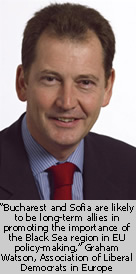 “I don’t expect fixed alliances to emerge,” says Graham Watson, president of the Association of Liberal Democrats in Europe (ALDE).
“I don’t expect fixed alliances to emerge,” says Graham Watson, president of the Association of Liberal Democrats in Europe (ALDE).
He says that Bucharest and Sofia are likely to be long-term allies in promoting the importance of the Black Sea region in EU policy-making.
German MEP Markus Ferber, one of the most fierce critics of Romania before EU accession, has emphasised the good German-Romanian and Italian-Romanian cooperation in the European Parliament relationships. This may be due to the fact that Germany and Italy are Romania’s two greatest trade partners.
French euro-enthusiastic MEP Ari Vatanen says that as a newcomer, Romania’s natural reference group will be the post-communist states in central Europe.
“But we need to find solutions which work for the whole of the EU,” he says. “It is crucial to understand that the common good makes us all richer than thinking based on a zero sum ideology.”
Meanwhile, German MEP Ingo Friedrich believes that the ties between Romania and the former soviet bloc could emerge in areas such as agriculture, regional development and foreign affairs.
But American professor Roy H Ginsberg, an expert on EU history, is sceptical of the efficacy of short-term alliances. “Coalitions of the willing and shifting alliances are less preferable than building long-term relationships with states in the EU that share Romania’s vision,” he adds.
Looking at the vision Romania needs, professor diplomat Iordan Gheorghe Barbulescu says that when it comes to finding alliances on policies that breach the development gap between old and new member states, Romania should rally with the members that benefited the most.
This includes Portugal, Ireland, Spain and Slovakia.
“From the largest six members, Romania is not interested in Great Britain,” he says. “We sometimes understand each other with France, with Spain, Italy and Poland just on specific issues and never with Germany.”
But Czech MEP Jan Zahradil argues that in the Parliament, for instance, on the question of EU institutional reform, Romania supports the conclusions of the German presidency.
Romania is an enthusiastic Euro-member and its EU policy has, in the past, followed European Commission’s opinion and spirit. Its inhabitants are also the most pro-integrationist people in Europe.
On the three biggest headaches for the EU, Romania has adopted the integrationist and federalist model.
It has shown bi-partisan backing for the EU Constitution, single energy policy and promotes Turkish membership to the EU.
| Model behaviour |
How will Romania behave in the EU to achieve its goals? |



